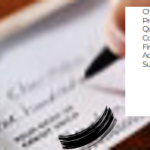The Punjab-Haryana High Court delivered a landmark judgment on November 30, 2023, significantly protecting wives facing charges under Section 138 of the Negotiable Instruments Act (NI Act). This decision clarifies the legal position of joint account holders and their individual liabilities in financial matters.

The Case: Fighting for Justice
The petitioner, Shalu Arora, challenged a complaint filed against her under Section 138 of the NI Act for allegedly dishonouring a cheque drawn from a joint bank account. Her primary argument was that she had not signed the cheque, even though she was a joint account holder. She asserted that she should not be held liable for an act she did not commit.
Shalu’s proactive and courageous pursuit of justice, coupled with the Court’s meticulous analysis, has paved the way for a crucial legal precedent. This judgment not only protects wives from unwarranted criminal charges but also upholds the judiciary’s commitment to ensuring fairness and individual accountability in complex financial situations.
Key Takeaways: Safeguarding Spousal Rights In Section 138 NI Act
The High Court, through its insightful analysis, emphasized the essence of Section 138 of the NI Act. It firmly stated that the offense could only prosecute the drawer of the cheque, the person who signs it. The Court referred to legal precedents, including the cases of Alka Khandu Avhad vs. Amar Syamprasad Mishra (2021) and Aparna A Shah vs. M/s Sheth Developers P. Ltd. (2013), reinforcing the principle that the drawer is singularly liable.
Crucially, the Court emphasized that Shalu, the petitioner, did not sign the cheque in question. While the cheque originated from a joint account, the Court reasoned that joint account holders cannot face prosecution unless each signatory participates in issuing the cheque.
Verdict and Implications: A Decisive Step Forward In Section 138 NI Act
In a decisive ruling, the Court quashed the complaint and summoning order against Shalu, granting her plea. However, it allowed the proceedings against her husband, Raman Kumar Arora, who signed the cheque, to continue.
This judgment establishes a vital precedent by safeguarding the legal position of spouses, particularly wives. It clearly states that joint account holders. Especially spouses, cannot be held criminally liable for cheques drawn by their partners unless they are signatories. This reiterates the need for a stringent interpretation of penal provisions and upholds individual responsibilities.
Conclusion: Empowering Spouses through Law
This landmark judgment empowers spouses, especially wives, by shielding them from unnecessary legal burdens and upholding their individual accountability. The Court’s decision sets a clear legal precedent that safeguards the rights of spouses in financial matters and promotes fairness and transparency in financial transactions.
This case also highlights the importance of legal awareness and proactive action when facing such situations. Shalu’s determination and legal expertise played a crucial role in obtaining this favorable outcome.



Leave a Reply